State Career Technical Education (CTE) policy initiatives and programs vary across the nation; innovations across states can offer helpful insights for state CTE leaders to continue to support each learner’s path to success in the career of their choice without limits.
This post provides an overview of Louisiana’s recently enacted Act 370 (H.B. 323) 2022 Regular Session, known as the “Back On Track Louisiana Pilot Program”, and how it connects with CTE programs to support justice-connected individuals.
The “Back On Track Louisiana Pilot Program” aims to reduce recidivism in Louisiana by offering incarcerated individuals the tools they need, such as driver’s licenses and bank accounts, to skillfully navigate their reentry into the workforce. It also provides a CTE funding mechanism and establishes a mandate for data accountability within correctional education spaces.
Program Background
This legislation stands out as an innovative means to not only incentivize high-quality correctional education programs by rewarding outcomes with additional funding. It allows for the flexibility needed to make the program effective for individual populations and meet each program’s needs. With the appropriate connections between state agencies such as the Louisiana Community and Technical College System (LCTCS) and the Louisiana Workforce Commission (LWC), the Department of Public Safety and Corrections (DPSC) can leverage industry partnerships and maximize the effectiveness of the credential programs they offer within their correctional facilities.
With the “Back On Track Louisiana Pilot Program”, justice-involved learners who are incarcerated will have the opportunity to earn multiple credentials of value that align with Louisiana’s Industry Based Credential (IBC) Focus List compiled by the Louisiana IBC Council. These credentials of value ensure learners are prepared for high-skill, high-wage, in-demand occupations that support the future workforce of the state. This effort aligns with other funding mechanisms to support correctional education and high-quality programs such as the state’s utilization of Strengthening Career and Technical Education for the 21st Century Act (Perkins V) federal funds. In Louisiana, the state allocates a portion of its Perkins funds to DPSC to ensure learners experiencing unique circumstances such as incarceration have access to relevant workforce education and training. Offering learners in correctional facilities the opportunity to explore career pathways will not only allow them to reenter the workforce and their communities as a whole but will also strengthen CTE programming in an often overlooked population.
Funding Flexibility
The legislation provides guidelines for funding and accountability while also establishing a framework for sheriffs to personalize their programs. The language of the law requires jails and prisons to collect the information of participating incarcerated and paroled individuals regarding specific success metrics. While these metrics track measures for these individuals to successfully reintegrate into their communities, there are several explicitly targeting CTE initiatives, namely whether the inmate:
- Achieved literacy skills of at least a 10th-grade reading level
- Earned a high school diploma or GED equivalent
- Earned an industry-based credential (IBC)
- Secured employment opportunity prior to release
To ensure each sheriff has a scalable funding system for their program, DPSC calculates half of the average number of days of incarceration of the enrolled individual multiplied by the amount the Department pays the sheriff each day for the housing of inmates in parish jails. As an additional incentive for the successful execution of the program, sheriffs will receive a bonus stipend per incarcerated individual based on the percentage of targets successfully attained. Funds will be used for equipment, instructional materials and instructors, allowing smaller programs to flourish as well as larger programs.
Program Customization
Authority for this legislation is housed at the DPSC, which already offers ten programs eligible for Perkins V funding: Automotive Technology, Building Technology, Carpentry, Collision Repair, Construction Project Management, Electrician, Heavy Equipment Operator, HVAC, Small Engine, and Welding. The prison system has employed a method to train and hire correctional facility instructors for the Industry Based Credential (IBC) classes offered at each facility. Each participating facility ensures that all justice-connected tutors/instructors remain up to date in their training by providing funding to renew all pertinent certifications, as needed. CTE instructors are supervised by a prison education coordinator who is responsible for maintaining the cohesiveness of the entire education department.
The “Back On Track Louisiana Pilot Program” is a new initiative seeking to provide more accessible and equitable CTE credential programs to justice-involved learners. The following resources provide additional on connections between CTE and corrections education:
- Making Good on the Promise: Improving Equity and Access to High-Quality CTE for Youth and Young Adults in the Justice System
- Oklahoma: Oklahoma CareerTech Skills Center
Brice Thomas, M.Ed, Policy Associate
*Special thanks to Dr. Brittney Baptiste Williams, State Director for Career and Technical Education, Louisiana for her insights that contributed to this post.


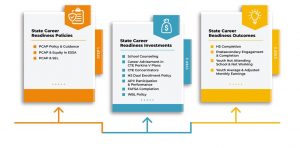 In May, the Coalition for Career Development Center released the first annual
In May, the Coalition for Career Development Center released the first annual 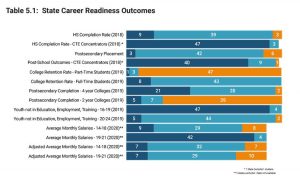 For postsecondary CTE concentrators, the report finds that 40 states are placing 70 percent or more of secondary learners into postsecondary training and education, military or employment after high school graduation. Only three states, however, are placing 70 percent or more of all high school graduates into either a two-year or four-year postsecondary training or education program. The report recommends expanding post-school data points as well as counting military service and employment as post-school outcomes for learners.
For postsecondary CTE concentrators, the report finds that 40 states are placing 70 percent or more of secondary learners into postsecondary training and education, military or employment after high school graduation. Only three states, however, are placing 70 percent or more of all high school graduates into either a two-year or four-year postsecondary training or education program. The report recommends expanding post-school data points as well as counting military service and employment as post-school outcomes for learners.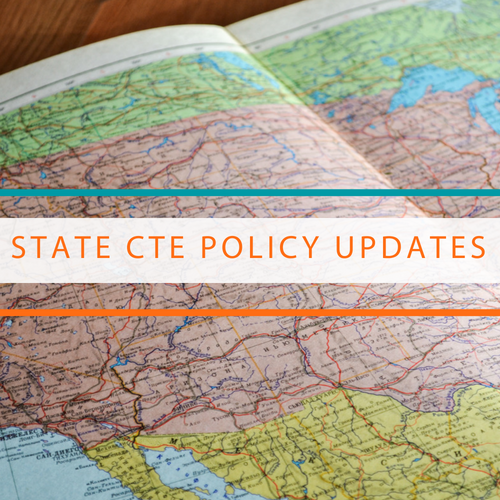 State education agencies, legislators and educators faced significant challenges from
State education agencies, legislators and educators faced significant challenges from 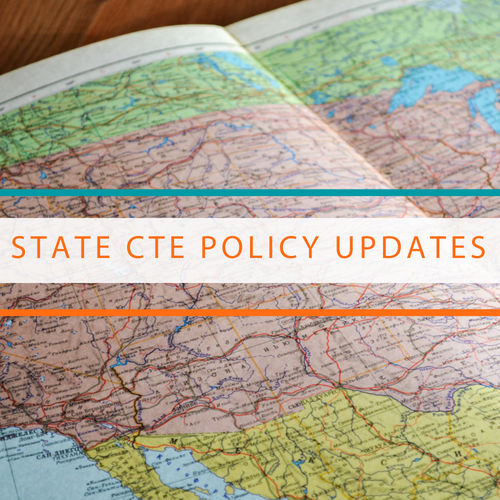 State education agencies, legislators and educators faced significant challenges from
State education agencies, legislators and educators faced significant challenges from 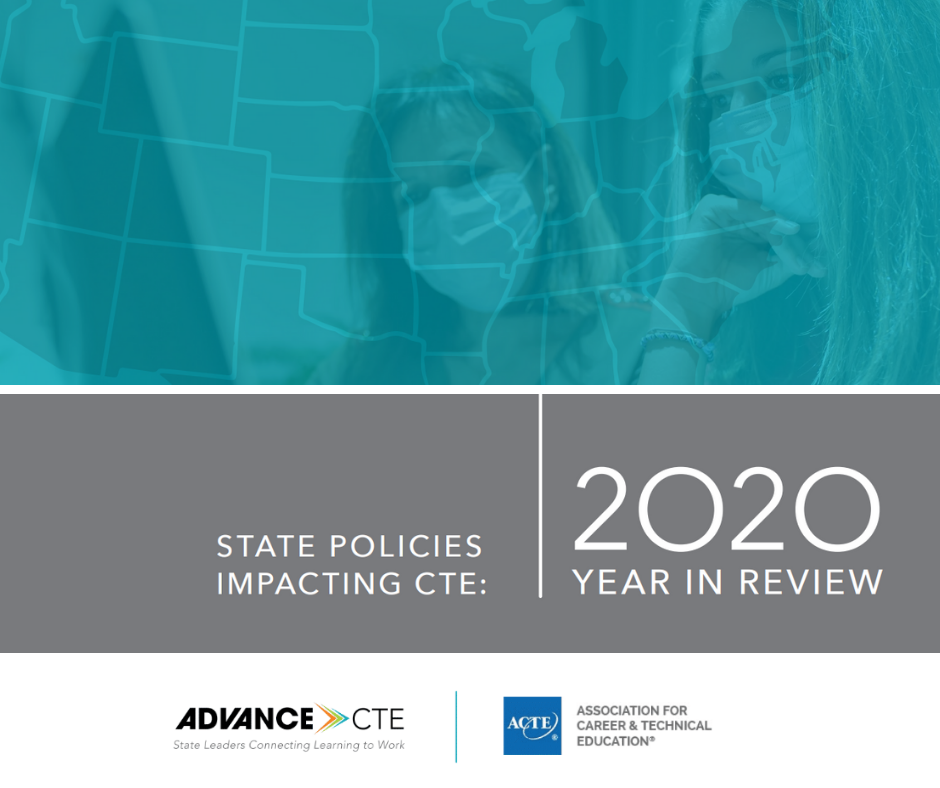 On the state and federal level, COVID-19 (coronavirus) fundamentally changed the conversation about education, significantly disrupting and refocusing state legislatures. Despite this, Career Technical Education (CTE) adapted to the challenges brought about by the coronavirus, continuing to deliver high-quality programming nationwide across all learner levels despite significant disruptions to education delivery. Because the pandemic was on the forefront of federal, state and local governments’ agendas, fewer policies and budget provisions for CTE were enacted than in previous years; in calendar year 2020, 31 states enacted or passed 67 policy actions related to CTE and career readiness.
On the state and federal level, COVID-19 (coronavirus) fundamentally changed the conversation about education, significantly disrupting and refocusing state legislatures. Despite this, Career Technical Education (CTE) adapted to the challenges brought about by the coronavirus, continuing to deliver high-quality programming nationwide across all learner levels despite significant disruptions to education delivery. Because the pandemic was on the forefront of federal, state and local governments’ agendas, fewer policies and budget provisions for CTE were enacted than in previous years; in calendar year 2020, 31 states enacted or passed 67 policy actions related to CTE and career readiness.